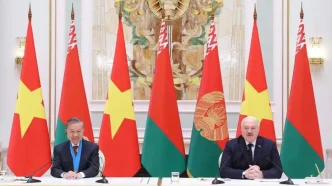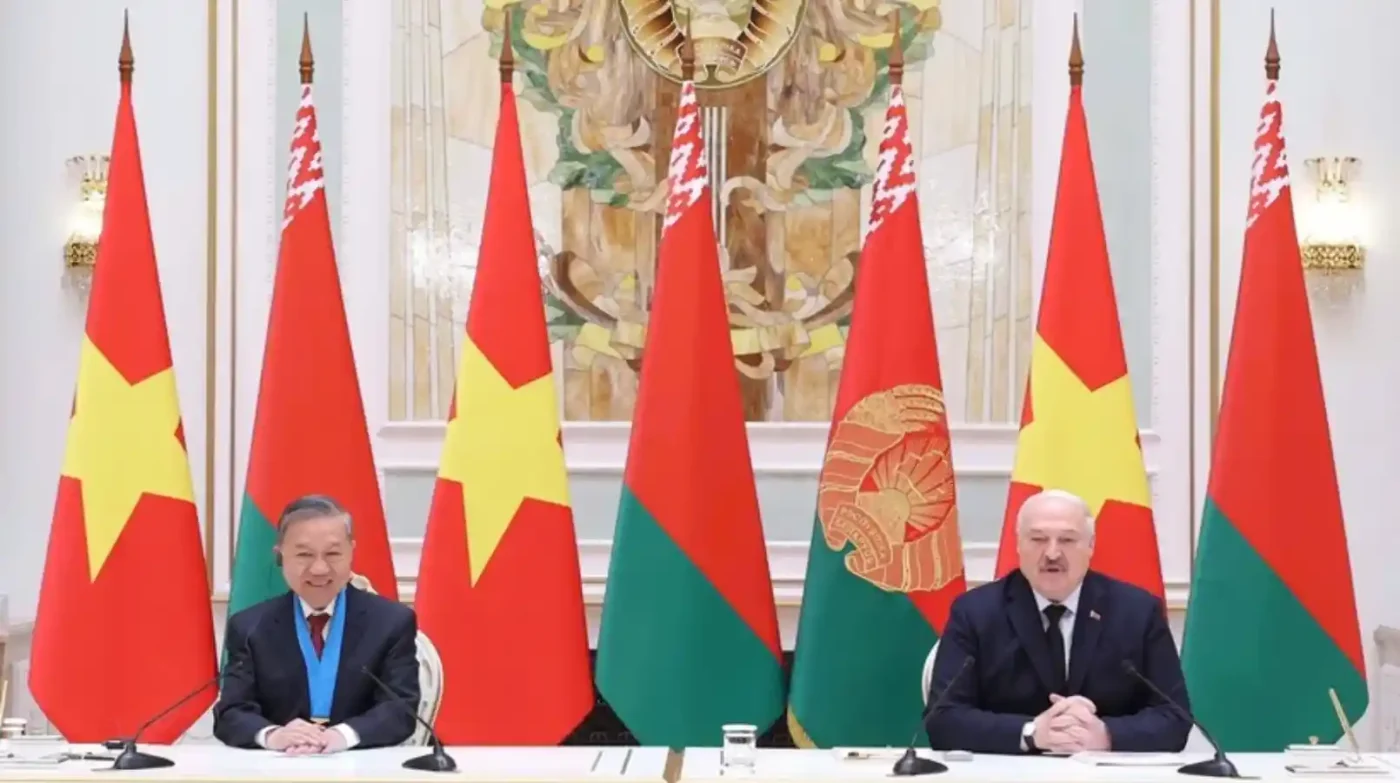In a significant step forward for bilateral relations, Vietnamese Party General Secretary Tô Lâm and Belarusian President Aleksandr Lukashenko announced the elevation of their countries’ relationship to a Strategic Partnership during talks in Minsk on May 12, 2025. The historic agreement, cemented during General Secretary Lâm’s visit to Belarus, marks a new chapter in the 33-year diplomatic history between the two nations, promising deeper cooperation across political, economic, and cultural spheres.
A Milestone in Bilateral Ties
The announcement came during a joint press statement in Minsk, where both leaders expressed optimism about the future of Vietnam-Belarus relations. President Lukashenko described the visit as a “historic milestone,” emphasizing the genuine friendship and shared commitment to long-term collaboration that underpins the upgraded partnership. He underscored Belarus’s intent to fully implement all agreements signed during the visit, which cover a wide range of sectors, including science, technology, healthcare, justice, and cultural exchange.
General Secretary Lâm echoed this sentiment, expressing gratitude for the warm welcome extended to the Vietnamese delegation. He highlighted the success of the talks, noting that both sides reviewed the current state of their relationship and agreed on measures to broaden cooperation in traditional areas while exploring new fields of mutual interest. “This visit aims to usher in a new phase in bilateral relations” said Lâm, signaling Vietnam’s commitment to strengthening ties with Belarus.
Strategic Partnership: A Framework for the Future
The centerpiece of the Minsk talks was the adoption of a Joint Declaration on the Establishment of a Strategic Partnership between Vietnam and Belarus. This declaration lays the foundation for enhanced collaboration, with both leaders expressing confidence that it will benefit their peoples and contribute to regional and global stability. The partnership builds on over three decades of diplomatic relations, established in 1992, which have seen growing political trust and robust cooperation in areas such as national defense, security, trade, and education.
Under the new framework, the two countries aim to intensify cooperation in key areas, including politics, diplomacy, defense, and economic trade. General Secretary Lâm emphasized the potential for collaboration in emerging fields such as the digital economy, digital transformation, and energy, which could open up new strategic spaces for mutual growth. President Lukashenko, meanwhile, highlighted Belarus’s readiness to supply Vietnam with competitive export goods, including tractors, automobiles, and agricultural products, as part of efforts to boost trade ties.
Economic and Trade Cooperation
A significant focus of the talks was on enhancing economic collaboration. Both leaders agreed to strengthen the role of the Vietnam-Belarus Intergovernmental Committee on Economic, Trade, Scientific, and Technical Cooperation, a key mechanism for driving bilateral trade. They also committed to leveraging the Vietnam-Eurasian Economic Union (EAEU) Free Trade Agreement, which provides a platform for expanding market access for businesses from both nations.
President Lukashenko called for the creation of favorable conditions for companies to operate in each other’s markets, a move that could stimulate investment and trade. While specific figures on current trade volumes were not disclosed during the press statement, the emphasis on agricultural and industrial goods suggests a targeted approach to addressing trade imbalances and fostering economic synergy. For Vietnam, access to Belarusian machinery and agricultural products could support its ongoing industrialization and rural development efforts, while Belarus could benefit from Vietnam’s growing consumer market and strategic position in Southeast Asia.
People-to-People and Cultural Links
Beyond economic and political objectives, the Strategic Partnership also prioritizes cultural and people-to-people exchanges. Initiatives such as the opening of a direct flight route between the two countries are already underway, aimed at fostering tourism and enhancing cultural understanding. President Lukashenko noted the potential for stronger links between localities in Vietnam and Belarus, which could serve as a grassroots foundation for broader bilateral ties.
Agreements signed during the visit on education, training, and cultural cooperation further underscore this commitment. These initiatives are expected to build on existing educational exchanges, which have seen Vietnamese students studying in Belarus and vice versa, creating a network of personal and professional connections that could drive future collaboration.
Defense and Security Collaboration
Defense and security emerged as another critical area of focus during the Minsk talks. Both leaders agreed to continue collaboration in the defense industry, military medicine, training, counter-terrorism, and information exchange. General Secretary Lâm highlighted the importance of cooperation in cybersecurity, reflecting the growing significance of digital threats in the modern geopolitical landscape.
While specific details on defense agreements were not publicly disclosed, the emphasis on these areas suggests a mutual recognition of shared security challenges. For Vietnam, deepening defense ties with Belarus could provide access to technical expertise and equipment, complementing its broader efforts to modernize its military capabilities. For Belarus, collaboration with Vietnam offers an opportunity to strengthen its strategic presence in Asia, amid complex regional dynamics.
Regional and International Implications
The talks in Minsk also provided a platform for in-depth discussions on regional and international issues of mutual concern. While the specifics of these discussions were not revealed, the leaders’ joint commitment to peace, stability, and development in their respective regions and beyond indicates a shared vision for addressing global challenges. The Strategic Partnership could position Vietnam and Belarus as constructive partners in multilateral forums, advocating for cooperative solutions to issues such as climate change, economic inequality, and geopolitical tensions.
For Vietnam, the partnership with Belarus aligns with its foreign policy of diversifying international relations and maintaining a balance between major powers. By strengthening ties with a country outside the immediate sphere of influence of its larger neighbors, Vietnam reinforces its independent stance on the global stage. For Belarus, the agreement offers a chance to expand its diplomatic footprint in Southeast Asia, a region of growing economic and strategic importance.
Challenges and Opportunities Ahead
Despite the optimism surrounding the Strategic Partnership, challenges remain in translating agreements into tangible outcomes. Economic cooperation, while promising, may face hurdles such as logistical barriers, regulatory differences, and competition from other trading partners. The effectiveness of mechanisms like the Intergovernmental Committee will depend on sustained political will and bureaucratic coordination on both sides.
Moreover, the broader geopolitical context could influence the partnership’s trajectory. Belarus’s close ties with Russia and Vietnam’s delicate balancing act in its relations with major powers like China and the United States may introduce complexities. If navigated carefully, however, these dynamics could also present opportunities for Vietnam and Belarus to play complementary roles in fostering dialogue and stability across regions.
A New Chapter for Vietnam and Belarus
The elevation of Vietnam-Belarus relations to a Strategic Partnership during the Minsk talks on May 12, 2025, represents a bold step forward for both nations. Building on a foundation of trust and mutual benefit established over the past three decades, the agreement signals a shared ambition to deepen cooperation across a wide range of fields. From trade and technology to defense and cultural exchange, the partnership promises to deliver benefits for the peoples of both countries while contributing to broader regional and global goals.
As the two nations begin to implement the agreements and roadmap outlined during the visit, questions remain about how this partnership will evolve in the face of domestic and international challenges. For now, the commitment expressed by General Secretary Tô Lâm and President Aleksandr Lukashenko offers a hopeful vision of collaboration, one that could reshape the contours of Vietnam-Belarus relations for years to come.
















